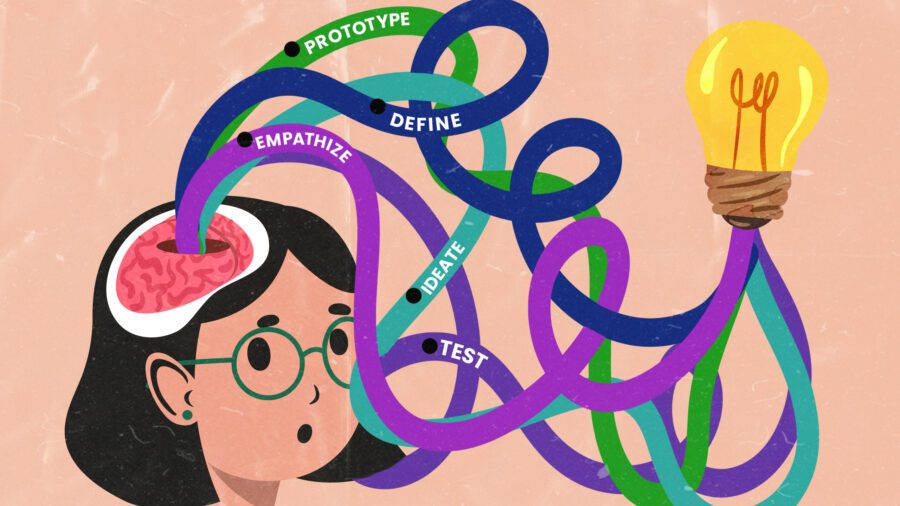
What’s Your Subconscious Trying to Tell You? Use Free Writing to Find Out
What if you had a way to access all the wisdom of your intuition?
What questions would you ask, what help you get, and what guidance would you seek if you could call on your subconscious mind for answers?
We often look to other people for help when we feel lost. But as much as we need other people, it’s our relationship with ourselves — including our subconscious mind — that’s most important. Building this relationship takes time and daily practice, but it also brings invaluable rewards.
Within the subconscious mind, you may find wisdom and guidance alongside memories of past experiences, mental programs that run like computer programs, and old beliefs. Making friends with your subconscious helps you uncover what’s going on beneath the surface, including the things that help you and hinder you.
One of the best ways to access the subconscious is through free writing. This time-tested technique is a favorite of writers and artists who use it to break through writer’s block, generate ideas, process emotions, or simply get their tangled mess of thoughts out of their heads and onto the page.
You don’t have to be a writer to benefit from free writing, though. It’s a tool for psychological and emotional growth, self-care, and even pleasure. In this article, you’ll learn how to clear your mind and connect to your subconscious through the fun, relaxing process of free writing.
What is Free Writing?
Free writing is a technique in which you write whatever is on your mind or heart without hesitation or thought. Also known as stream of consciousness, free writing follows no organized path of meaning or structure and is typically utilized in journaling because it’s often highly personal.
When free writing, you won’t pay attention to grammar or structure, and you won’t try to write something that sounds “good.” Free writing liberates you from those constrictions and instead allows you to access your inner world, most especially your subconscious world, that houses emotions, experiences, and beliefs you may not have known were there.
It typically involves taking 10 to 15 minutes or so to write without stopping. Once you put pen to paper, you keep going even if it means writing nonsense (like “I don’t know what to write about.”) Since stopping leaves a lot of time for the inner critic to step in, the goal is to keep the flow of words continuously flowing.
You might be free-associating, going from describing the delicious breakfast you’re about to have to the time you ate that same food in Italy to how much fun Italy was and how you miss travel.
You might be scribbling about intense feelings, concerns, fears, or other powerful emotions. Or, you might be writing stuff that sounds pretty mundane and bland, such as chores you’re worried about or minor irritations.
You may also end up with pieces of writing or themes you can creatively use later, if you’re so inclined. On the other hand, maybe what you’ve written makes no sense at all. Either way is fine. The process is what matters most, and the process has the most benefits. Let’s look at a few of those benefits now.
Digest Emotions
To stay healthy, we have to digest our emotions just as much as we digest our food. But all too often, we mask them with Netflix, scrolling, alcohol, or any other number of distractions. This might feel good in the moment, but at the end of the day, we do ourselves a disservice when we avoid our emotions.
Free writing helps us process feelings in a healthy way. Spending 15 minutes free writing and allowing your emotions to bubble up and release may be more uncomfortable than online shopping, but you will have felt and digested the emotions. Feelings are less threatening when you stop running from them, and processing emotions gets you to the other side of them more quickly, so you can focus on joy and peace.
Connect To Your Intuition
No one knows you like you know yourself. Advice and support from others are critical, yet having our own advice and support is invaluable. However, in the rush of life and the noise of our minds, it’s easy to get lost. The peaceful, quiet voice of intuition gets drowned out by mental chatter all too often.
Luckily free writing can help us overcome those barriers. By casting off the limits of structure, logic, and the analytical mind, we more freely connect with our creative, intuitive mind. It’s not uncommon to uncover unexpected answers to dilemmas or insights into your life through the process of free writing.
Free writing can also help you connect to your intuition outside of the practice. As you unload your mind of worries and fears, you have more internal space to receive intuitive guidance.
Discover Subconscious Material
Along the same lines as connecting to your intuition, free writing helps us uncover what’s lying beneath our conscious minds. Many social scientists and psychologists say that around 95% of brain activity occurs in the subconscious, which means that it’s safe to say that the subconscious plays a significant part in driving our behavior.
Free writing does away with limits and structure, which means you’re free to flow with whatever images and ideas are coming to mind. Think about it. You’re just writing about what comes up, you didn’t consciously generate the ideas, so you’re dealing directly with the subconscious.
As you free-write regularly, you may find certain patterns coming up again and again. Those are the key to what’s happening well beneath the surface of your mind.
Enhance Creativity
Do you consider yourself creative? So many people don’t, but that couldn’t be further from the truth. Maybe your creativity comes out in a way that’s unconventional, like nurturing your kids, preparing a meal, or designing your lifestyle. Plus, you’re constantly creating your life through your thoughts, beliefs, and actions.
Since free writing is a direct line to the subconscious, it’s also a direct line to the creative mind. This means free writing gives you more access to and control over the role creativity plays in your life. Through this process, you may discover symbols, ideas, and themes you didn’t even know existed within you. These can be fuel for creative projects but also for living a more purposeful, intentional life.
Join In 200 Million+ On The Journey to Greatness
How to Get Answers From Your Subconscious Mind Via Free Writing
As you’ve seen, free writing can be therapeutic, pleasurable, relaxing, and lead to creative, intuitive, and psychological insights. When it comes to tapping into your subconscious, there are a few techniques that are especially helpful. Here are a few of them:
Morning Pages
Morning Pages is a free writing technique created by Julia Cameron and popularized in her book The Artist’s Way. The practice is simple. Every morning, free write three pages before you start your day. Don’t stop until you’ve hit three pages, even if you don’t know what to write.
You could write about anything from what you plan to do that day to affirmations you’ve been practicing to worries on your mind from the day before.
As you journal, you may find significant emotions, themes, fears, or other subconscious material bobbing up to the surface. Make a note of these, particularly if there are any patterns or insights into issues you have going on in your life. Technically, morning pages aren’t intended to be read later, but if you use them to tap into the subconscious, you may want to review them periodically.
If you notice something important, flag the page and revisit it. Maybe it’s an idea that would make a good story or essay (if you’re a writer). Maybe it’s a theme you’ll want to bring up with your therapist or coach. Perhaps you notice you always gravitate towards talking about certain things, like travel. That could be your sign to incorporate more travel into your life.
There’s no wrong way to do morning pages, and it’s a practice that you may find you look forward to.

Learn The Secrets Of Some Of The Greatest Minds In The World
The Greatness Mindset shows you how to unleash your greatness by clarifying who you are, discovering your Meaningful Mission, and stepping into how you can make an authentic, unique contribution to the world.
Learn MoreAutomatic Writing
You can also try focusing on a specific issue you need help with via automatic writing. Automatic writing is a variation of free writing, though it’s typically used in a more focused way, such as for answering a question.
Let’s say you want to know what your subconscious thinks about a specific person in your life:
To write automatically about it, you’d sort of imagine that your subconscious is taking over your hand and writing whatever first comes to mind. You can have a conversation with this part of you, asking a question and then writing the response. Automatic writing can make you feel even more consciously removed from the process than in free writing.
But as we know, the conscious mind is pretty noisy, as is the voice of doubt, so it can be tough to truly get into the space of automatic writing and trust whatever comes. That’s why automatic writing is best done after meditation, yoga, prayer, or any other time you’re in a deeply relaxed state, like after waking up.
Learning to trust what you wrote can be even more challenging than the process itself, but do it often, and you will start to develop that trust.
Dream Journaling
One of the easier ways to connect to your subconscious is through dream work. Free writing about your dreams will help you have better dream recall, process the contents of your dream, build a natural bridge to your unconscious, and increase your ability to be an active participant in your dreams — either through lucid dreaming or having questions answered during dream time.
A great way to do this is by keeping a journal and pen next to your bed that you can grab as soon as you wake up, then simply write everything you can remember. This can be hard at first.
If you’re like most people, trying to recall details of your dream is like trying to chase fog. The more you grasp, the more elusive it all becomes. With practice, though, dream journaling can extend the length of time you can recall details and help you decipher them more easily. The key is not to try and describe everything. Just a few words are fine. Write down images, words, and, most importantly, feelings. Over time, you may find you can describe more and more details.
You can also use free writing to set intentions for your dream time. You might write down a question you need answered and place it under your pillow. Or, you can write down things you want to process or feel during your dreams, such as vocab words for a language you’re learning.
You Can Connect To Your Subconscious Mind
There are so many treasures waiting to be discovered in your subconscious mind, and you don’t need expensive hypnosis sessions or therapy to access them. Simply pick up a pen and paper and write whatever comes up for a few minutes every day. It’s that simple.
Then, in the midst of a pretty mundane rambling about daily stresses, you may find something that stirs your soul — like a memory long forgotten or the face of your childhood best friend. You would be amazed at what lies beneath the surface of your conscious mind and how much beauty and healing there is in it.
Greatness Authors
Greatness Authors is a collection of writers, thinkers, curiosity experts, and students of the world who are committed to bringing you the most up-to-date, impactful, and inspiring information surrounding Greatness topics.

Redefining Poetry: How Instagram Sensation Rupi Kaur Showed That Poetry Is for Everyone

The Young Professional’s Guide to Advocating for Yourself at Work & Setting Healthy Boundaries

Olympian Yusra Mardini’s Incredible Story of Resilience, Rescue, and Refugee Rights

A Beginner’s Guide to Effortlessly Attracting Money and Growth Opportunities

Psychologist Edith Eger’s Inspirational Journey to Find Forgiveness and What It Means for You










